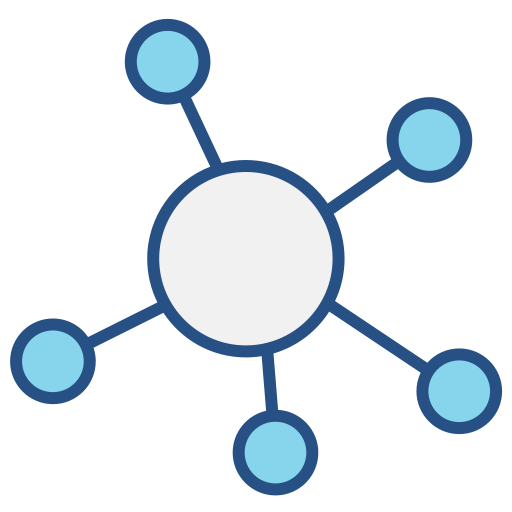Resolvers#
Resolvers define how to fetch the data defined in your schema. There are many ways to access your data but resolvers are just a simple async function that return either an object or a dictionary that matches the shape of the Schema return type.
This could be the raw json response from a third party library or it could be a database model that represents your data. The great thing about resolvers are they are completely flexible as long as the type you are returning is correct. Which means you can combine loosly related items into a single parent.
Using the API#
- class cannula.api.API(schema, context=None, middleware=[], root_value=None, **kwargs)#
Your entry point into the fun filled world of graphql. Just dive right in:
import cannula api = cannula.API(schema=''' extend type Query { hello(who: String): String } ''') @api.resolver('Query') def hello(who): return f'Hello {who}!'
- Parameters:
schema (
Union[str,DocumentNode,Path]) – GraphQL Schema for this resolver. This can either be a str or pathlib.Path object.context (
Optional[Any]) – Context class to hold shared state, added to GraphQLResolveInfo object.middleware (
List[Any]) – List of middleware to enable.root_value (
Optional[TypeVar(RootType, covariant=True)]) – Mapping of operation names to resolver functions.kwargs – Any extra kwargs passed directly to graphql.execute function.
- async call(document, request=None, variables=None)#
Preform a query against the schema.
This is meant to be called in an asyncio.loop, if you are using a web framework that is synchronous use the call_sync method.
- Return type:
ExecutionResult
- include_resolver(resolver)#
Include a set of resolvers
This is used to break up a larger application into different modules. For example you can group all the resolvers for a specific feature set:
from cannula import Resolver from database import Book, filter_books, get_book book_resolver = Resolver() @book_resolver.query async def books(parent, info, **args) -> list[Book]: return await filter_books(**args) @book_resolver.query async def book(parent, info, book_id: str) -> Book: return await get_book(book_id)
Then include the resolver in the main cannula API:
import cannula import pathlib from features.books import book_resolver api = cannula.API(schema=pathlib.Path('.')) api.include_resolver(book_resolver)
- mutation(field_name=None)#
Mutation Resolver
Short cut to add a resolver for a mutation, by default it will use the name of the function as the field_name to be resolved:
api = cannula.API(schema="type Mutation { make_it(name: String): String }") @api.mutation async def make_it(parent, info, name: str): return "hello world" @api.mutation(field_name="make_it") async def some_other_something(parent, info, name: str): return "override the function name"
- Parameters:
field_name (
Optional[str]) – Field name to resolve, by default the function name will be used.- Return type:
Any
- query(field_name=None)#
Query Resolver
Short cut to add a resolver for a query, by default it will use the name of the function as the field_name to be resolved:
api = cannula.API(schema="type Query { something: String }") @api.query async def something(parent, info): return "hello world" @api.query(field_name="something") async def some_other_something(parent, info): return "override the function name"
- Parameters:
field_name (
Optional[str]) – Field name to resolve, by default the function name will be used.- Return type:
Any
- resolver(type_name, field_name=None)#
Field Resolver
Add a field resolver for a given type, by default it will use the name of the function as the field_name to be resolved:
api = cannula.API(schema="type Book { name: String }") @api.resolver("Book") async def name(parent, info): return "hello world" @api.resolver("Book", field_name="something") async def some_other_something(parent, info): return "override the function name
- Parameters:
type_name (
str) – Parent object type name that is being resolved.field_name (
Optional[str]) – Field name to resolve, by default the function name will be used.
- Return type:
Any
- class cannula.api.ParseResults(document_ast, errors)#
-
document_ast:
DocumentNode# Alias for field number 0
-
errors:
List[GraphQLError]# Alias for field number 1
-
document_ast:
- class cannula.api.Resolver#
This class is a helper to organize your project as it grows. It allows you to put your resolver modules and schema in different packages. For example:
app/ api.py # `api = cannula.API(args)` resolvers/ books.py # `books = cannula.Resolver()` movies.py # `movies = cannula.Resolver()`
You then register resolvers and dataloaders in the same way:
resolvers/books.py:
import cannula from database.books import get_books books = cannula.Resolver() @books.query('books') async def get_books(source, info, args): return await get_books()
resolvers/moives.py:
import cannula from database.movies import get_movies, fetch_movies_for_book movies = cannula.Resolver() @movies.query('movies') async def get_movies(source, info, args): return await get_movies() @movies.revolver('Books', 'movies') async def list_movies_for_book(book, info) -> list[Movie]: return await fetch_movies_for_book(book.id)
app/api.py:
import cannula from resolvers.books import books from resolvers.movies import movies api = cannula.API(schema=SCHEMA) api.include_resolver(books) api.include_resolver(movies)
- mutation(field_name=None)#
Mutation Resolver
Short cut to add a resolver for a mutation, by default it will use the name of the function as the field_name to be resolved:
resolver = cannula.Resolver() @resolver.mutation async def make_it(parent, info, name: str) -> str: return "hello world" @resolver.mutation(field_name="make_it") async def some_other_something(parent, info, name: str) -> str: return "override the function name"
- Parameters:
field_name (
Optional[str]) – Field name to resolve, by default the function name will be used.- Return type:
Any
- query(field_name=None)#
Query Resolver
Short cut to add a resolver for a query, by default it will use the name of the function as the field_name to be resolved:
resolver = cannula.Resolver() @resolver.query async def something(parent, info) -> str: return "hello world" @resolver.query(field_name="something") async def some_other_something(parent, info) -> str: return "override the function name"
- Parameters:
field_name (
Optional[str]) – Field name to resolve, by default the function name will be used.- Return type:
Any
- resolver(type_name, field_name=None)#
Field Resolver
Add a field resolver for a given type, by default it will use the name of the function as the field_name to be resolved:
resolver = cannula.Resolver() @resolver.resolver("Book") async def name(parent, info) -> str: return "hello world" @resolver.resolver("Book", field_name="something") async def some_other_something(parent, info): return "override the function name
- Parameters:
type_name (
str) – Parent object type name that is being resolved.field_name (
Optional[str]) – Field name to resolve, by default the function name will be used.
- Return type:
Any
